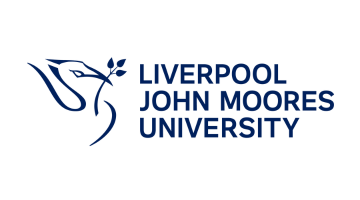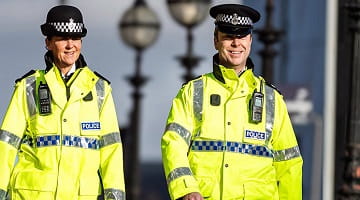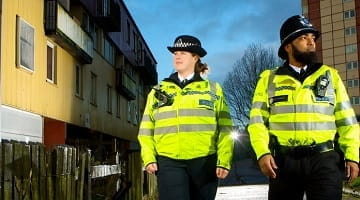Why study this course with LJMU?
- Licensed by The College of Policing, the professional Statutory and Regulatory Body (PSRB) for Policing
- Innovative and thought-provoking modules both reflect and challenge current policing practices and debates
- Taught by lecturers and practitioner academics, who are former serving officers of all ranks and roles, from Constable to Chief Constable
- Access our innovative Crime Scene Investigations facilities
- Field trips include Merseyside Firearms Training Centre and the Emergency Services Training Centre as part of your core modules
- Opportunities to volunteer as a Special Constable in Merseyside Police and other local forces
- Regular career workshops and symposiums delivered by police officers and police career specialists to prepare you for a career in policing, security, risk management or criminal justice
About your course
The BA (Hons) Policing and Investigations degree at Liverpool John Moores University provides students with the knowledge and skills to consider direct entry into the role of a detective.
Each student is allocated a personal tutor whose role is to offer general advice, guidance and support regarding the broader aspects of your studies and university life in general.
You will be taught at Mount Pleasant Campus in the Liverpool Centre for Advanced Policing, a pioneering research centre for interdisciplinary law enforcement, and is licensed by the College of Policing to deliver degree programmes.
Course modules
What you will study on this degree
Further guidance on modules
Modules are designated core or optional in accordance with professional body requirements, as applicable, and LJMU’s Academic Framework Regulations. Whilst you are required to study core modules, optional modules provide you with an element of choice. Their availability may vary and will be subject to meeting minimum student numbers.
Where changes to modules are necessary these will be communicated as appropriate.
Core modules
Core modules
Optional modules
Core modules
Optional modules
Professional accreditation
All of our qualifications conform to the professional and regulatory guidelines established by The College of Policing and have been developed to reflect changes in the way that police constabularies are recruiting new constables nationally.
Your Learning Experience
Excellent facilities and learning resources
As part of this degree programme, you have access to our innovative Crime Scene Suites on campus and also take part in role-play and scenario tasks at the Emergency Training Centre in Birkenhead.
The programme is delivered by academic staff and practitioner academics, who are former serving officers of all ranks and roles, from Constable to Chief Constable. All staff are experienced in a wide range of subject areas and specialisms.
Throughout the programme there is a student mentoring scheme that supports students in their academic, professional and personal development.
There is also a wider School of Justice Studies Mentoring Programme that works with criminal justice agencies, such as policing, crime prosecution services, prison, probation and youth justice.
Both employers and students should benefit significantly from this programme. Students gain employability skills and insights into specific careers, while employers experience the rewards of mentorship and the opportunity to share their knowledge with enthusiastic students.
Work-related Learning
Work-related learning is incorporated into every level of this programme so that once you graduate you will be equipped with a range of transferable skills and knowledge in analysis and interpretation, presentation, teamwork, initiative and research.
You will be strongly encouraged to become a Special Police Constable, a police volunteer or to volunteer within the criminal justice field throughout your studies so that you can gain practical insight into operational practices, build professional relationships and enhance your employability skills for police and related criminal justice professions after graduation.
Blended learning
We adopt an active blended learning approach, meaning you will experience a combination of face-to-face and online learning during your time at LJMU. This enables you to experience a rich and diverse learning experience and engage fully with your studies. Our approach ensures that you can easily access support from your personal tutor, either by meeting them on-campus or via a video call to suit your needs.
Teaching is delivered through a combination of lectures, online activities, workshops and seminars all of which you are expected to attend. In addition you will be supported to develop your skills relating to independent study and group work. You will need to participate in online activities and discussions using our virtual learning environment, Canvas.
Dedicated personal tutor, plus study skills support
Assessment varies depending on the modules you choose, but will usually include a combination of exams and coursework.
We understand that all students have different strengths and preferences when it comes to assessments, so we use a variety of methods to assess your work structured across the academic year. These include essays, exams, fieldwork projects, reports, case studies, portfolios, online blogs and wikis, workplace practice, posters, presentations (individual and group), debates, reviews and group work.
You will normally receive extensive written feedback on your assessments, and occasional verbal feedback. All feedback is designed to help you achieve your full potential and get the most out of your studies, so staff will be available to discuss it with you and direct you to further support if you feel you need it.
Where you will study
Based at the John Foster Building, in the Mount Pleasant Campus, the Crime Scene Suite is an innovative facility that gives students the opportunity to explore crime scene perspectives and investigate approaches.


The Chief Officers of the force have been pleased with the programme at LJMU and view it as being a significant development with regards to assisting professionalisation and the development of the workforce.
Career paths
Graduates find themselves working a variety of policing roles, such as operational officers, police staff, or wider law enforcement agencies, others are in a career that is not directly concerned with policing such as armed services, prison service, social work or criminal justice-related roles within the Civil Service.
Employability is a core module of the degree, where in your final year you will be encouraged and supported to consider your career path in policing.
For graduates who wish to apply for police constable roles in England and Wales, need to do so within five years of graduating. Achieving this degree is a requirement but does not guarantee appointment to a police force. Recruitment and appointment is subject to the relevant regulations and requirements of police recruitment and selection processes. This includes medical and fitness testing along with background and security checks. Recruitment and selection processes are rigorous and may vary between forces.
Candidates applying to join a police constabulary must also undertake a series of assessments including National Recruitment processes and Force vetting. Guidance on recruitment can be found on the College of Policing website.
For graduates who seek careers outside of police constable roles, may find themselves working in:
- Border Force Control
- National Crime Agency
- Police Staff - Researchers, Analysts or Advisors
Student Futures - Careers, Employability and Enterprise Service
A wide range of opportunities and support is available to you, within and beyond your course, to ensure our students experience a transformation in their career trajectory. Every undergraduate curriculum includes Future Focus during Level 4, an e-learning resource and workshop designed to help you to develop your talents, passion and purpose.
Every student has access to Careers Zone 24/7, LJMU's suite of online Apps, resources and jobs board via the LJMU Student Futures website.
Tuition fees and funding
- Full-time per year:
- £9,535
Fees
The fees quoted above cover registration, tuition, supervision, assessment and examinations as well as library membership and student IT support with access to printed, multimedia and digital resources including programme-appropriate software and on campus Wi-Fi.
Financial Support
The University offers a range of scholarships to support students through their studies. You'll find all the information you need on our specialist funding pages, including details of the Student Support Fund and other activities to support with the cost of living.
Additional Costs
In addition to fees, students should also keep in mind the cost of:
- Accommodation
- Travel costs including those for placements, visas and travel for studying abroad and field trips unless paid for by LJMU
- Stationery, IT equipment, professional body membership and graduation gown hire
The University reserves the right to increase tuition fees in accordance with any changes to the maximum allowable fees set by the UK Parliament. In the event of such a change, any fee increase will be subject to a maximum cap of 10% of the total course cost as originally stated at the time of your offer.
Entry requirements
Please choose your qualifications below to view requirements
Grades/points required from qualifications: BCC - BBB (104 - 120)
Work out how many UCAS points your qualifications are worth by visiting the UCAS Tariff Calculator.
Qualification requirements
How to apply
Securing your place at LJMU
Your university life
From accommodation and academic support to clubs and societies. Find out what LJMU has to offer.
Related Links
Talk to our students
Connect with a current LJMU student for advice and guidance on university life, courses and more.
See what our students are saying
At LJMU we want you to know you're making the right choice by studying with us. You can see what our students are saying about their experience with us through their reviews on the following websites:
Related Links
News and views
Browse through the latest news and stories from the university
The university reserves the right to withdraw or make alterations to a course and facilities if necessary; this may be because such changes are deemed to be beneficial to students, are minor in nature and unlikely to impact negatively upon students or become necessary due to circumstances beyond the control of the university. Where this does happen, the university operates a policy of consultation, advice and support to all enrolled students affected by the proposed change to their course or module.
Further information on the terms and conditions of any offer made, our admissions policy and the complaints and appeals process.





























